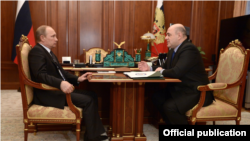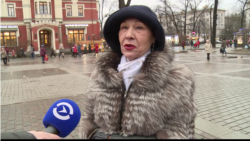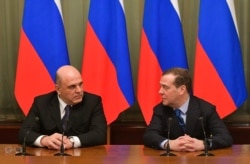With an unexpected new prime minister and a presidential call to expand parliament’s powers, it might seem like Russia has embarked on a political makeover. But Russian analysts interviewed by Current Time caution that Russian President Vladimir Putin’s January 15 state-of-the-nation speech was more about the appearance of change than the reality.
“So many events in the course of one day, so much intrigue” -- like “some kind of active FSB (Federal Security Service) operation, without an explanation of the reasons,” summarized the Carnegie Moscow Center’s Andrei Kolesnikov.
“[T]his is not a democratic procedure, it goes without saying,” commented Yekaterina Shulman, a Moscow political analyst who focuses on Russian lawmaking. “They’re announcing something to us about something that was prepared somewhere in quiet. “
Yet despite the blitz of presidential proposals, underlined Shulman, Putin’s ideas are not “radical” and “do not change the composition of our political system.”
She advised first against considering the most immediate result of those proposals – newly confirmed Prime Minister Mikhail Mishustin, Russia’s 53-year-old former tax chief -- as Putin’s designated heir apparent when the Russian president’s term ends in 2024.
“Structural changes are much more important” than who gets what position, Shulman commented. “And the structural changes are not very substantial, let’s put it that way.”
Among the most substantial changes outlined in his speech to the Federal Assembly, Putin proposed allowing the State Duma, the lower house of parliament, to select prime ministers and confirm cabinets; formalizing the “status and role” of the advisory State Council; forbidding legislators, senior officials, and judges from holding foreign citizenship or foreign residency permits; empowering the president and Federation Council, parliament’s upper chamber to remove the country’s most senior judges from office; and scrapping observance of international treaties deemed unconstitutional.
Analysts appeared at odds about how this proposed “new power construction” will actually function. They termed the president’s ideas “unclear,” “totally various,” or “debatable.”
“I think that Putin himself doesn’t completely understand it,” commented former Putin adviser Gleb Pavlovsky, a political analyst.
“We could talk about early presidential elections, early parliamentary elections: Everything’s possible in this setup,” said Kolesnikov, who runs the Carnegie Moscow Center’s Russian Domestic Politics and Political Institutions Program. “Russia is the country of possibilities, as the expression goes.”
The possibility of parliament, rather than the president, selecting Russia’s prime minister and confirming his or her premiership and cabinet attracted some analysts, but Pavlovsky termed the proposal a “shop-window, decorative thing.”
“Every person in the country understands that the government that (the Duma) will confirm, the list (of cabinet nominees) it will receive, will come from where it used to receive it -- the Kremlin.”
Like many others, political analyst and commentator Dmitry Oreshkin believes that Putin proposed that parliament name Russia’s prime minister because he himself intends, for the third time, to hold the post after 2024. The pro-Putin United Russia Party currently controls Russia’s bicameral legislature.
Pavlovsky, though, pushed back against that conclusion.
“You have to completely not understand Putin to think that he ponders such…issues,” he said. Putin knows that “everything can change” before 2024, and his plans as well, he added.
Political analyst Kirill Rogov also does not see a clear game plan yet. “If you’re elected president, then you have, they say, a lot of power, and if Putin doesn’t intend to be president, then he has to create structures that balance that power…” said Rogov, a senior researcher at the non-profit INDEM Foundation, a democracy advocate. “Putin has kind of opened the door on building this system, but we don’t know yet how it will be built.”
The president’s proposal to define in the constitution “the status and role” of the State Council piqued Pavlovsky’s interest, however.
An advisory body chaired by the president, the State Council coordinates between various government bodies. Its membership roster is a who’s-who of Russian powerbrokers: the speakers of the Federation Council and State Duma, the chairpersons of all Duma parties, and the heads of government and executive agencies in Russia’s eight federal districts.
A hope exists among Russia’s political elite, Pavlovsky reported, that the Council “will come to life” by looking like “a second Kremlin” that is “no less significant than the first one.”
By contrast, the Constitutional Court, a 19-judge high court that rules on the constitutionality of legislation, treaties, and presidential decrees, grabbed the attention of constitutional law scholar Ilya Shablinsky.
Putin’s proposal that the Court make such judgments on draft legislation as well could provide “preliminary constitutional monitoring,” he said, but he fears that the proposal to allow the president and Federation Council to remove judges for suspected misconduct would eliminate what little independence from the Kremlin the Court has.
“Now, after these revisions, the president will be able to do whatever he pleases with the Constitutional Court. The Federation Council is just an instrument in his hands, but the Constitutional Court judges after such revisions will become totally dependent.”
Shablinsky, however, downplayed concerns over another proposed judicial reform. Giving the Russian Constitution precedence over signed or tentative international treaties already is the norm for the Constitutional Court; particularly for rulings from the European Court of Human Rights, he noted.
Why Putin opted to pursue any of these changes now caused further debate.
Pavlovsky believed that Putin wanted the government to “regain the initiative” for new ideas. The president wants “a new constitution, a new cabinet, and a new power structure” as a commemorative “pyramid” or “Arch of Triumph” to his 20 years in power, he said.
Kolesnikov also maintained that Putin “does not want to be a lame duck” president. For that reason, he conjectured, the president may have refrained from “putting all his cards on the table” about his constitutional proposals.
One lawyer, however, argued that Putin had no choice but to call for changes.
“Today, it’s obvious that the concentration of power in the executive and the situation in this area has run into a dead end,” said Oleg Rumyantsev, one of the authors of Russia’s 1990-1993 constitution. “It’s plain that revolutionary sentiments have seriously started to develop because of this, and it’s impossible to ignore them.”
Following large-scale anti-government protests last year in Moscow and other large cities, 72 percent of 1,616 adults surveyed by the Levada Center, an independent pollster, stated in late October 2019 that the interests of society and government are “probably not” or “definitely not” in sync.
A series of street interviews conducted by Current Time throughout several major Russian cities ahead of Putin's speech appeared to confirm that finding.
Perhaps with such views in mind, the president spent roughly the first 50 minutes of his speech addressing social-welfare topics, but some analysts saw his promises to reform primary healthcare and increase child-support payments as intended only to secure support for constitutional changes.
“This is a bribe for the population, to put it quite crudely,” commented sociologist Konstantin Gaaze, a senior researcher at the Moscow Higher School of Social and Economic Sciences.
A date for a national vote on the president’s proposed constitutional changes has not yet been set.
Direct welfare payments to voters on the eve of the 2021 Duma elections, however, “will create the feeling,” Gaaze added, “that things are improving.”
For Vladimir Zhirinovsky, leader of the nationalist Liberal Democratic Party, some things already seem to be improving.
Giving parliament the right to confirm the prime minister and cabinet means that Russia “will become more democratic,” he predicted.
Deputy Duma Chairwoman Irina Yarovaya, a deputy from United Russia, agreed: “I think other countries have got a lot to learn from Russia when it comes to democracy,” she said.








